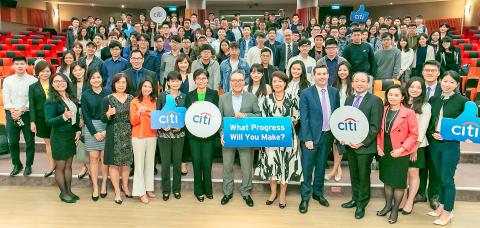Citibank Taiwan Ltd (台灣花旗) yesterday announced its graduate recruitment plan for next year, targeting the development of financial technology and online banking businesses, as it held a recruitment orientation session at National Taiwan University, the first in a series of campus meetings.
Willing to recruit talented graduates without financial backgrounds, the bank is to hold campus meetings next month at National Tsing Hua University, National Chao Tung University and National Chengchi University, Citibank Taiwan said.
Citi country officer Paulus Mok (莫兆鴻) said the bank is looking for students who will graduate next year for its Analyst/Associate (AA) program.

Photo courtesy of Citibank Taiwan Ltd
It is also looking for students who are scheduled to graduate in 2020 for its summer intern program next year, he said.
Mok, who participated in the Citibank’s management associate (MA) program, said the program is 40 years old and has helped turn many talented young people into professionals.
Students hired in Taiwan would have an opportunity to work overseas, because Citibank has a global training project that allows employees to work and undergo training abroad.
In the past, the AA program usually took two years to complete, but the bank can extend the training to three years if necessary, Mok said.
Some projects need more time for complete and the bank’s senior managers could tutor in person, he said.
“It is the right time, right place and right industry,” Mok told NTU students, adding that to develop financial technology, the bank needs diverse talents, such as engineers who could help with blockchain technology or big data analysis.
While the bank attracted more than 1,000 applications for the AA program, it has not set a recruitment cap for program yet, but would select the best candidates, he said.
It also expects to double the number of summer interns, he added.
“The bank is looking for talent with positive attitude,” Citibank Taiwan human resources officer Winifred Dente said, adding that though other positive characteristic matter, positive attitude brings success, as it is also good for human relations, which is what the bank cares about most.
Jason Chou (周冠宏), a NTU graduate who joined Citibank Taiwan through the training program a few years ago, said students who are curious and who can work well with others are desirable.

WEAKER ACTIVITY: The sharpest deterioration was seen in the electronics and optical components sector, with the production index falling 13.2 points to 44.5 Taiwan’s manufacturing sector last month contracted for a second consecutive month, with the purchasing managers’ index (PMI) slipping to 48, reflecting ongoing caution over trade uncertainties, the Chung-Hua Institution for Economic Research (CIER, 中華經濟研究院) said yesterday. The decline reflects growing caution among companies amid uncertainty surrounding US tariffs, semiconductor duties and automotive import levies, and it is also likely linked to fading front-loading activity, CIER president Lien Hsien-ming (連賢明) said. “Some clients have started shifting orders to Southeast Asian countries where tariff regimes are already clear,” Lien told a news conference. Firms across the supply chain are also lowering stock levels to mitigate

Six Taiwanese companies, including contract chipmaker Taiwan Semiconductor Manufacturing Co (TSMC, 台積電), made the 2025 Fortune Global 500 list of the world’s largest firms by revenue. In a report published by New York-based Fortune magazine on Tuesday, Hon Hai Precision Industry Co (鴻海精密), also known as Foxconn Technology Group (富士康科技集團), ranked highest among Taiwanese firms, placing 28th with revenue of US$213.69 billion. Up 60 spots from last year, TSMC rose to No. 126 with US$90.16 billion in revenue, followed by Quanta Computer Inc (廣達) at 348th, Pegatron Corp (和碩) at 461st, CPC Corp, Taiwan (台灣中油) at 494th and Wistron Corp (緯創) at

NEW PRODUCTS: MediaTek plans to roll out new products this quarter, including a flagship mobile phone chip and a GB10 chip that it is codeveloping with Nvidia Corp MediaTek Inc (聯發科) yesterday projected that revenue this quarter would dip by 7 to 13 percent to between NT$130.1 billion and NT$140 billion (US$4.38 billion and US$4.71 billion), compared with NT$150.37 billion last quarter, which it attributed to subdued front-loading demand and unfavorable foreign exchange rates. The Hsinchu-based chip designer said that the forecast factored in the negative effects of an estimated 6 percent appreciation of the New Taiwan dollar against the greenback. “As some demand has been pulled into the first half of the year and resulted in a different quarterly pattern, we expect the third quarter revenue to decline sequentially,”

ASE Technology Holding Co (ASE, 日月光投控), the world’s biggest chip assembly and testing service provider, yesterday said it would boost equipment capital expenditure by up to 16 percent for this year to cope with strong customer demand for artificial intelligence (AI) applications. Aside from AI, a growing demand for semiconductors used in the automotive and industrial sectors is to drive ASE’s capacity next year, the Kaohsiung-based company said. “We do see the disparity between AI and other general sectors, and that pretty much aligns the scenario in the first half of this year,” ASE chief operating officer Tien Wu (吳田玉) told an